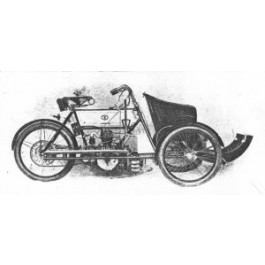Riley was founded in the 1890 in Coventry. (UK) when William Riley acquired the Bonnick Cycle Company. Up until 1900 the company had produced mainly bicycles and even produced a prototype 4 wheeled car in 1899 that was never put into production. It was at the 1900 National Cycle show that a “Royal Riley” motor tricycle was exhibited with a 2.5 hp De-Dion engine. Riley experimented with a 3-wheeled car from 1902 that would be light and carry two passengers.
Riley’s first Tricar was produced in 1904 and showed strong signs of being based around a motorcycle. It used a 4.5 hp single cylinder water cooled engine designed and built by the Riley Engine Company. (This was founded in 1903 by William Riley’s son; Percy who was working on a design for a 8 hp water cooled engine) The engine was built in to the frame and used a 2 speed gear box that was driven by a primary chain with a secondary chain drive from the outer side of the box to the hub of the rear road wheel. Unlike most 3 wheelers of the time the Riley Tricar also featured a starting handle that fitted into the rear end of the engine shaft.
With the 1905 model of the Riley Tricar the appearance became much more car like with changes that included swapping the saddle for a “bucket seat”. The handle bars were replaced by a steering wheel and it was now had a choice of the air cooled 4 hp engine for 70 guineas and three water cooled engines; the 4.5 hp for 85 guineas, the 6 hp for 120 guineas and the 9 hp for 130 guineas.
The 9 hp Riley Tricar often swept the board in competitions. Its only real rival was the Singer Tricar that was fitted with the Riley engine. Amongst other trophies the Tricar received a gold medal for making a 125 mile non-stop journey on just two and three quarters of a gallon of petrol. In 1905 and 1906 the Tricar appeared again and again in published competition results for Hill climbs, Reliability runs and Trials.
In 1907 the external appearance of the Tricar became more polished though no other changes were made until production of the Tricar ceased a few years later.
Riley ceased making bicycles in 1911 and introduced a new 4-wheeler in 1919. Riley was then sold privately to Lord Nuffield when they went into receivership, and then later sold again to his own Morris Company.






